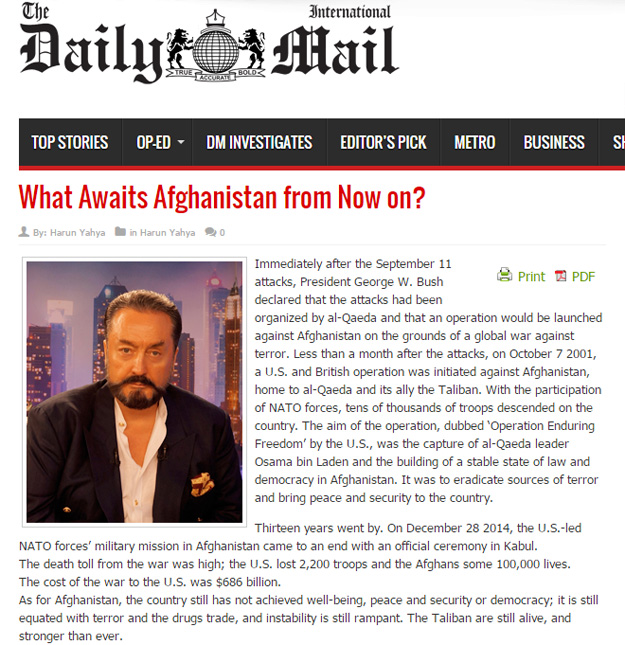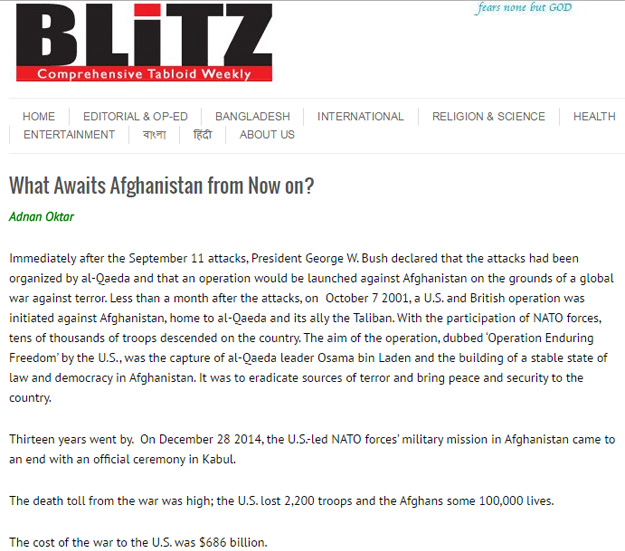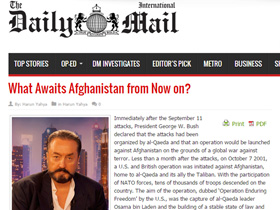
Immediately after the September 11 attacks, President George W. Bush declared that the attacks had been organized by al-Qaeda and that an operation would be launched against Afghanistan on the grounds of a global war against terror. Less than a month after the attacks, on October 7 2001, a U.S. and British operation was initiated against Afghanistan, home to al-Qaeda and its ally the Taliban. With the participation of NATO forces, tens of thousands of troops descended on the country. The aim of the operation, dubbed ‘Operation Enduring Freedom’ by the U.S., was the capture of al-Qaeda leader Osama bin Laden and the building of a stable state of law and democracy in Afghanistan. It was to eradicate sources of terror and bring peace and security to the country.
Thirteen years went by. On December 28 2014, the U.S.-led NATO forces’ military mission in Afghanistan came to an end with an official ceremony in Kabul.
The death toll from the war was high; the U.S. lost 2,200 troops and the Afghans some 100,000 lives.
The cost of the war to the U.S. was $686 billion.
As for Afghanistan, the country still has not achieved well-being, peace and security or democracy; it is still equated with terror and the drugs trade, and instability is still rampant. The Taliban are still alive, and stronger than ever.
The Taliban, who made use of the vacuum created by the Russian withdrawal from Afghanistan after the Soviet-Afghan War, were overthrown by the U.S.-led NATO intervention five years later. The organization fled to a few mountainous parts of Afghanistan and to Pakistan, and recovered its strength within a few years, embarking on a guerrilla war against the U.S. and its allies. It has again taken over many strategic areas today.
The increasing strength of the Taliban, particularly of late, which has inflicted severe losses on the army, police and civilian population, is ascribed to U.S. and NATO troops leaving the country while acts of terror were still going on and before security had been established. It is suggested that the withdrawal plan, which imposed all the responsibility for security on Afghan forces, has further increased Taliban aggression, and that Afghan forces simply cannot cope with the Taliban without assistance from NATO. The only grounds for rejoicing are that the fanatical and repressive Taliban are increasingly losing popular support. The Afghan people no longer want to live under an authoritarian regime closed to the outside world. This is extremely important in terms of an enlightened future for Afghanistan.
Although President Obama said that America has achieved a sound outcome during this process, many political analysts and observers are of the opinion that this particular mission in the war against terror in Afghanistan, which involved 57 countries over 13 years, had not actually been that successful. Indeed, the contributions of the U.S. and NATO during the process are way below expectations. The Afghans are still fighting hunger and trying to survive under very harsh conditions: Approximately half the population are unemployed, 70% face chronic hunger and only 13% have access to clean drinking water. Approximately 1.2 million children are malnourished and are dying of preventable diseases. In addition, more than 650,000 people have had to abandon their homes during the fighting; thousands are still living in tents.
In short, Afghanistan has suffered much, both materially and psychologically, and is still doing so. It has problems that have solidified over the years that have become seemingly intractable and insoluble. A prosperous Afghanistan freed from poverty, backwardness and injustice is still a dream for the Afghan people. Yet like all problems, the problems facing Afghanistan are capable of solution; with peace, love, friendship and brotherhood.
The way out for Afghanistan, which has constantly been invaded by outside forces due to its strategic location, lies in establishing unity and togetherness inside itself. Afghanistan is home to Pashtuns, Tajiks, Hazaras, Turkmens, Uzbeks, Kyrgyz, Aymaks and Baluchis and many other ethnic groups. All these components with Afghan identities have major responsibilities in a country wracked by wars terror and oppression. First, they must set aside the divisions caused by differences, remember that they are brothers, embrace one another for the sake of their country’s future and overcome their divisions with a brand new spirit of friendship, brotherhood, love, affection and tolerance. Afghanistan can attain peace, well-being and stability once this climate of brotherhood is established, and only then can a country based on true freedom, democracy and justice be built. The second important responsibility is to implement a progressive worldview that values quality, culture, art and beauty and advocates an advanced level of democracy for a bright and modern future.
If the Afghan people manage to become brothers and rid themselves of fanaticism, the country will be able to relax psychologically and this climate of peace will bring political stability with it. Moreover, the economy will improve and people suffering hunger and poverty will come to know prosperity. In addition to that, the requisite infrastructure for that is already there; the country has enormous mineral, oil and natural gas potential. The value of that potential is estimated to be at least $1 trillion, and it is predicted that Afghanistan can become one of the largest and most wide-ranging mineral producing countries in the world. These include rare minerals such as cobalt, gold, lithium and niobium. Experts say that these new mineral reserves will be enough to totally regenerate the economy of Afghanistan, which has been ravaged by war for decades on end. However, without internal peace, there can be no economic improvement and no political stability. We hope that the Afghan people will overcome all these problems by coming together with love, peace and brotherhood, and that they will help lay the foundations for a modern Afghanistan with no room for fanaticism within it.
Adnan Oktar's piece on Daily Mail & Blitz:
http://dailymailnews.com/2015/01/30/what-awaits-afghanistan-from-now-on/
http://www.weeklyblitz.net/2015/02/awaits-afghanistan-now/



